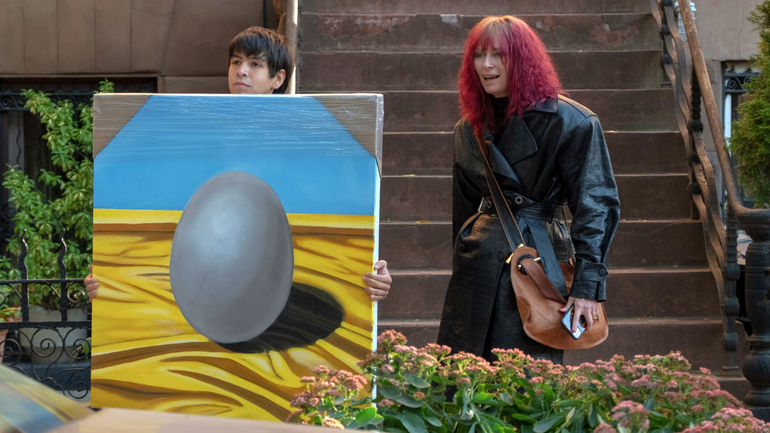
Embracing My Inner Problemista: A Hilarious Journey

Discover the unexpected twists and turns of this surreal comedy that goes beyond the surface.
I entered Problemista with a clear expectation of what I believed it to be. The trailer promises a surreal depiction of the American immigration journey, featuring vibrant bursts of color, vanishing unsuccessful visa applicants, and the striking presence of Tilda Swinton with occasionally glowing red eyes. It presents a blend of oddity, humor, and social commentary skillfully crafted by A24's marketing team into an easily digestible form, making the pursuit of a particular kind of uniqueness seem almost commonplace. Viewers may even leave the experience feeling that their expectations have been fulfilled.
Problemista effortlessly embodies this cinematic style; Julio Torres (the writer, director, and lead actor) utilizes familiarity to ensure his film remains approachable. His perspective on contemporary cinema mirrors that of his character Alejandro's perspective on toys: delightful, yet somewhat fixated on entertainment. Alejandro's inclination is to make subtle yet impactful modifications to existing toys, prompting a shift in our perception of them, a strategy also adopted by Torres in his film—adopting a surrealist approach. However, while such works typically aim to expand the mind, this one aims for the heart.
Problemista Critiques Systems, But Its Characters Are The Real Point
Tilda Swinton's Elizabeth is much more than she initially seems.
Alejandro's journey to visa sponsorship is reminiscent of a Kafkaesque scenario, albeit with a twist of empathy and optimism. Initially employed by a company that specializes in cryogenic services for terminally ill artists, he faces the irony of technology not yet capable of reviving them (resulting in a legal gray area resembling euthanasia). However, the company persists in charging for the maintenance of the cryo tubes. When Alejandro loses his job, the countdown begins for him to secure a new sponsor within a month, as if an hourglass has been flipped with his name on it.
Hope appears in the form of Elizabeth (Swinton), an art critic married to Bobby (RZA), the frozen artist under Alejandro's care. Despite her disorganized nature, demanding demeanor, and tendency to unleash her frustrations on unsuspecting individuals, she holds the key to Alejandro's visa sponsorship. In more contemporary terms, Elizabeth embodies the archetype of a Karen. Symbolically, she represents the monstrous obstacle that Alejandro's hero must confront in his quest. Yet, by orchestrating an exhibit for Bobby's egg-themed paintings, Alejandro could potentially secure the sponsorship he desperately needs.
Obstacles, if they can be overcome, are beneficial for our growth. They challenge us to look beyond our comfortable lives and explore new possibilities.
There is a depiction in Problemista where Elizabeth is portrayed as a tool for political criticism, illustrating how US policies impact Alejandro's reliance on an unpredictable individual. However, Elizabeth is a complex character who cannot be defined solely by her role in someone else's life. Swinton's portrayal captures the conflicting emotions driving her actions without simplifying her character to just being sympathetic. Our feelings towards her can shift between disapproval and empathy within a single scene, highlighting her multidimensional nature beyond the film's narrative framework.
Problemista makes a compelling case for the value of art. Torres, like Ale, sees the totality of her right away, and this is the magic of what his movie achieves. Despite successfully satirizing immigration law, thoughtless, predatory corporations, and even Craigslist (Larry Owens), there is a clear-eyed distinction between these systems and the human beings who exist within them. The surreal imagery and narration (from Isabella Rossellini, who should narrate everything) only clarifies this contrast. Problemista invokes the simplicity of myth without ever letting its characters become simplistic. Representatives are never just representatives, but people with their own feelings and values.
And for the power of asking for a manager.
Larry Owens and Julio Torres in a purple-hued, junk-filled physical manifestation of Craigslist in Problemista - And for the power of asking for a manager. - Problemista Makes A Compelling Case For The Value Of Art
This critique avoids oversimplification, providing depth by satirizing the challenges of immigrating to the US while acknowledging the resilience it fosters in immigrants. Elizabeth's unconventional approach to navigating the world becomes a focal point, showing that while her harsh criticisms may be misdirected, there is a strategy behind her actions. While systemic issues may be at fault, they lack a human face, unlike individuals who offer hope for initiating change.
Problemista's underlying message to marginalized individuals is somewhat contradictory: Embrace your assertiveness. While it may seem unrealistic to demand compliance from everyone, there is a need for empathy beyond Elizabeth's confrontational style. If the odds are stacked against you and you are determined to succeed, seek out those in power and advocate for change persistently. By doing so effectively, you can pave the way for a smoother journey for future generations.
Torres is equally interested in whether everyone who sees this movie will appreciate its layers and hear its messages. Art and artists, especially undervalued ones, are prominent in Problemista, highlighting the connection between their perseverance and that of an immigrant. The risk of going unseen is high for both. However, Dolores (Catalina Saavedra), Ale's artist mother, emphasizes that the appreciation of someone's art matters less than its existence. Even criticism, as an act of true seeing, is valued in this narrative.
Pulling at the thread reveals the organizing principles of this project. Obstacles, as long as they are surmountable, are beneficial for personal growth. Without them, we may never learn to see beyond the walls of our comfortable existence. These obstacles do not necessarily have to involve life-and-death stakes; art itself can serve as a significant obstacle. While not everyone may engage with Bobby's eggs, Ale's toys, or Problemista, there will always be someone who does. If they can learn to view artwork with empathy and depth, there is hope that they will extend this gaze to the unseen individuals in their lives.
Problemista releases in limited theaters March 1 before expanding nationwide March 22.
Editor's P/S:
The article on Problemista offers a thoughtful exploration of the film's surrealist style, its critiques of societal systems, and its emphasis on characters. The writer effectively captures the film's unique blend of humor, oddity, and social commentary. They also highlight the importance of looking beyond the surface of characters, particularly Tilda Swinton's Elizabeth, who is not simply a monstrous obstacle but a complex individual driven by conflicting emotions.
Overall, the article provides a nuanced and insightful analysis of Problemista, recognizing its strengths in satirizing immigration law, predatory corporations, and even Craigslist. It also acknowledges the film's underlying message about the power of art and the importance of empathy in navigating societal challenges. The article encourages viewers to appreciate the film's layers and messages, highlighting the connection between perseverance in art and immigration and the transformative potential of seeing others with empathy and depth.







